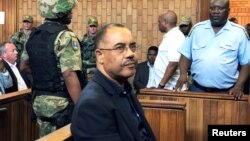Manuel Chang is a wanted man, facing extradition requests from both the United States and his native Mozambique.
On Tuesday, as a South African magistrate weighed dueling requests involving Chang, the defendant heard from two impassioned legal teams on just how much he is wanted.
The U.S. wants Chang for his alleged involvement in a massive case of financial fraud which spans four continents — Africa, North America, Europe and Asia (Middle East). Chang is one of several dozen people now implicated on both sides of the Atlantic. He was arrested on a U.S. warrant in December while traveling through South Africa's O.R. Tambo International Airport in Johannesburg.
The indictment, issued by the Eastern District of New York, accuses Chang and several others, some who were not named, of "creat(ing) the maritime projects as fronts to raise money to enrich themselves and intentionally divert(ing) portions of the loan proceeds to pay at least $200 million in bribes and kickbacks to themselves, Mozambican government officials and others."
Shortly after the American request went to court last month, Chang's native Mozambique countered with an extradition request of its own. According to South Africa, the Mozambicans did not issue an arrest warrant, so it's not entirely clear why they want him.
That secret loan led the coastal nation to suffer a debt crisis so severe it has deprived citizens of the most essential services, like road maintenance and maintained hospitals. The government has arrested more than 18 people over the matter, but critics of the government say they doubt the arrests and prosecutions are meaningful.
'Uncharted waters'
As Magistrate William Schutte put it, nothing about the case is straightforward.
"It seems as if, legally speaking, we are finding ourselves in uncharted waters," he said.
Schutte now must decide whether Chang should be extradited at all —and if so, where.
Chang's lawyer, Willie Vermeulen, made clear that his client would prefer to go home, and urged the magistrate — South Africa does not have jury trials — to consider agreeing to that request. He also urged Schutte to evaluate both extradition requests at the same time, not just the American one, which has been formally submitted to court, unlike Mozambique's.
"You cannot simply hand down a determination as if only one has been made and then the court is supposed to close its eyes to the second application," he said.
He also noted that the nation's international relations minister told local media last week that South Africa would also allow the extradition to Mozambique. That statement prompted an angry outburst from prosecutor JJ du Toit. The justice minister is the executive branch official with authority to rule on extradition requests.
"With the greatest respect, the minister's got no authority to make this pronouncement," he said. "She's prejudging the issue, which is not in the interest of justice."
While the legal experts attempt to untangle the situation, Chang, who was en route to a family holiday in Dubai when he was arrested, will remain in a South African cell. The court will reconvene March 7.








